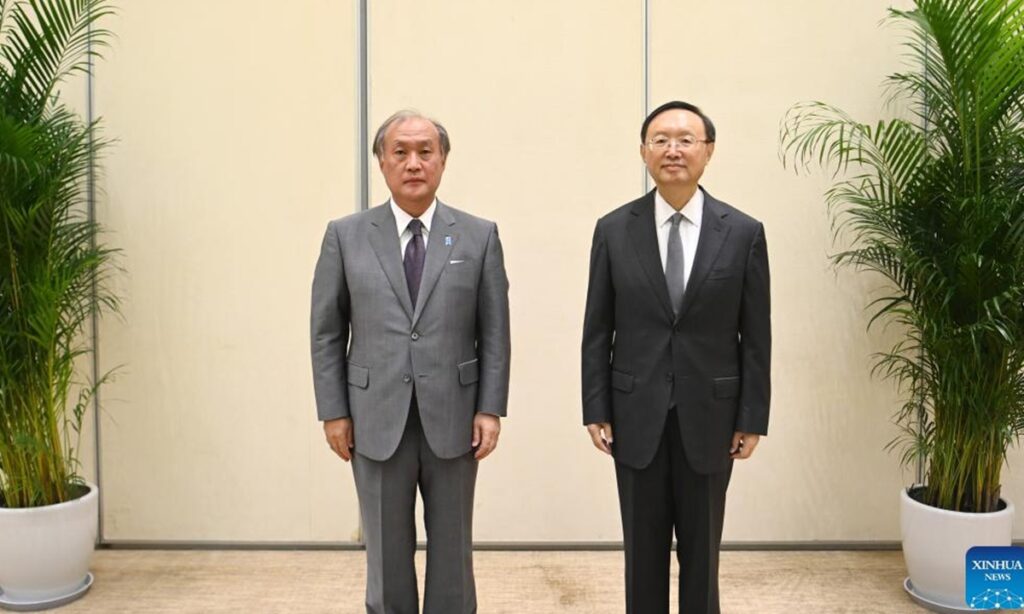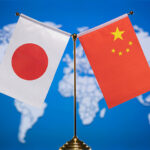Yang Jiechi, member of the Political Bureau of the CPC Central Committee and director of the Office of the Foreign Affairs Commission of the Communist Party of China Central Committee, on Wednesday co-chaired the ninth China-Japan high-level political dialogue with Takeo Akiba, secretary general of Japan’s National Security Secretariat in Tianjin. This is a high-level communication between China and Japan under a special background. The time is special and it is of great significance. The last high-level political dialogue between the two countries was two and a half years ago.
During this period, China-Japan relations have experienced many twists and turns, mainly due to the obvious negative changes in Japan’s China policy, especially some of its words and deeds over the Taiwan question are badly such as its recent performance before and after US House Speaker Nancy Pelosi’s provocative visit to the island of Taiwan, which has severely worsened Chinese public’s perception toward Japan. The overall strategic mutual trust between China and Japan is rapidly declining. If the trend cannot be curbed in time, it will inevitably have a serious and destructive impact on the bilateral relationship and the regional situation. At the same time, in the face of a complicated global situation, the regional and global significance of China-Japan relationship has become more prominent. This is the reason why China emphasizes the two countries must “uphold strong sense of responsibilities and insist on their own convictions.”
It’s reported that the dialogue on Wednesday lasted for about seven hours. Both sides agreed that the dialogue was candid, in-depth and constructive, and some useful consensus was reached. They will continue the communication. The Chinese side emphasized that the Taiwan question bears on the political foundation of China-Japan relations and the basic trust and good faith between the two countries. This point cannot be overemphasized. Japan must take a correct attitude toward China-Japan relations, keep its promises, and restrain the impulse to interfere in China’s internal affairs and challenge foundation of bilateral relations. Otherwise, not only will it be impossible to hold talks, but also China-Japan relations will face bigger risk to deteriorate further. The consequences will be unbearable for Japan.
Now Japan is always talking about “peace and stability in the Taiwan Straits,” forgetting that Japan itself bears historical crime and responsibility regarding Taiwan question. Taiwan is a part of China. Who else values and strives to maintain peace and stability in the Straits more than China? There is no need for outsiders to remind us of this. The facts are clear: “Taiwan independence” separatists and external interference forces are the destroyers of peace and stability in the Taiwan Straits, and China will resolutely fight against them with the confidence to win. Japan cannot stand in opposition to China’s safeguarding national sovereignty and territorial integrity. To put it more seriously, in that case, Japan will become the enemy of the Chinese nation.
Objectively speaking, mutual suspicion has long existed between China and Japan, which in recent years has been amplified and intensified by complex internal and external factors. Japan has developed a growing anxiety about China’s rapid development, which, though completely unnecessary in our view, is difficult for Japan to defuse. Such anxiety has made the country highly sensitive, almost neurotic, to China’s every move and often overreact as a result.
Meanwhile, neighboring countries are suspicious of Japan’s intentions because of its incomplete introspection on historical issues, its impatience in “amending the constitution and expanding military” and its “leading the way” to introduce US and Western military forces into the region and active cooperation with them. At present, there is a tendency that Japan may touch on China’s core interests, which makes the Chinese people more vigilant. Voices like “a Taiwan emergency is a Japanese emergency” sound really arrogant and ignorant to the Chinese people.
Those issues reflect the importance of why China and Japan should strengthen strategic communication. The Japanese side should heed the key positions of the Chinese side. In fact, China’s attitude has been consistent and clear, and there is nothing to hide. We hope that the two countries can coexist peacefully and cooperate in a friendly way, but we will not hesitate to hit back against actions that harm our core interests. As long as Japan holds a sincere attitude and plays its due role, there is no need to engage in military expansion and war preparation using money at a time when economy is stagnant. Strategic misjudgment will only bring Japan huge risk and uncertainty.
Next month will mark the 50th anniversary of the normalization of diplomatic relations between china and Japan. After half a century of ups and downs, the bilateral relations have accumulated fruitful results in fields including economic and trade cooperation and people and cultural exchanges, which brought substantial benefit to people of the two countries. One knows the destiny at 50. China-Japan ties should be more mature, stable, healthy and resilient. The two countries, especially the Japanese side, should use this important time to have a profound reflection of China-Japan exchange in the past 50 years, even over the past 2,000 years to seek inspiration for future development of relations. As the Chinese side emphasized, the two should work together to build a China-Japan relationship that meets the requirements of the new era.
(Global Times)




